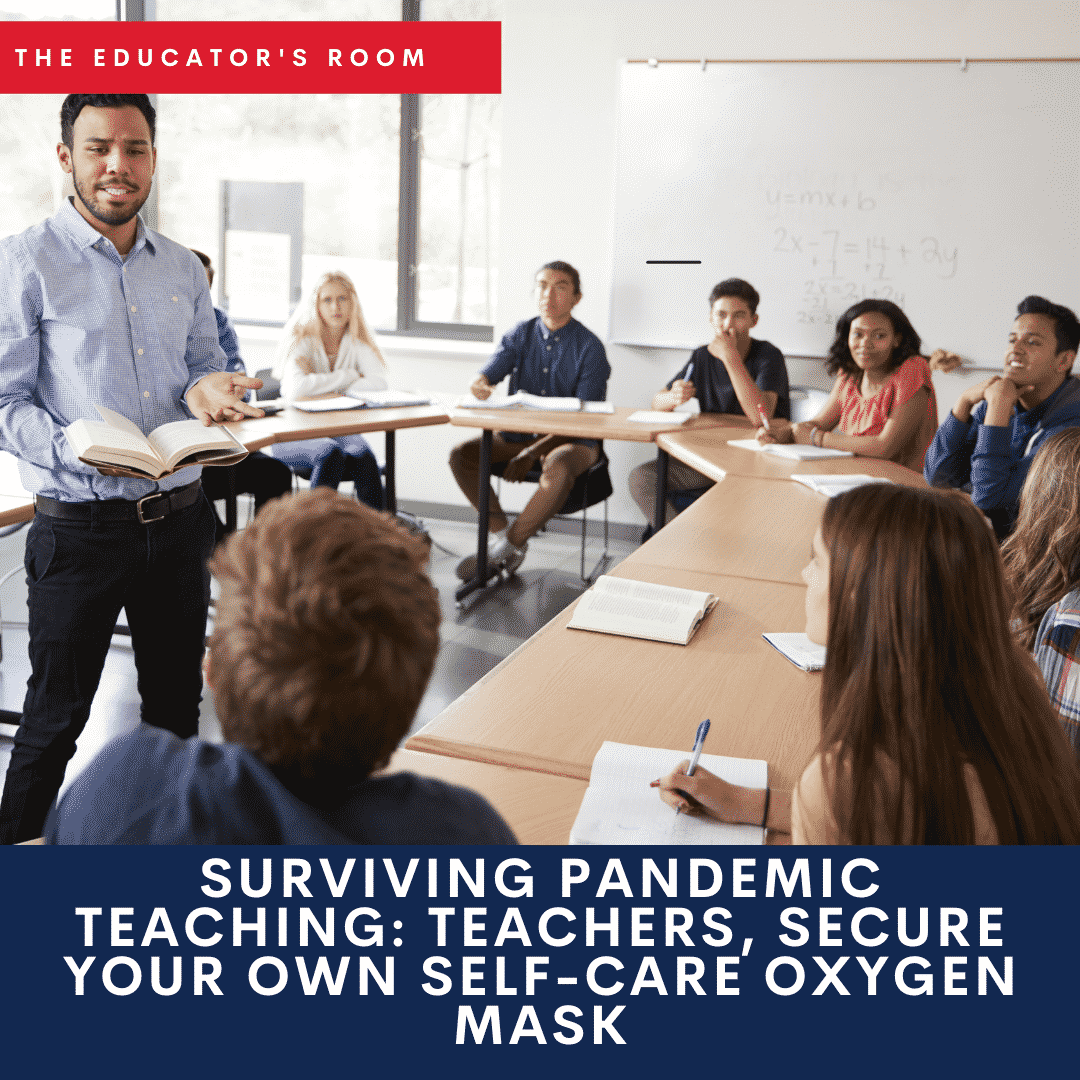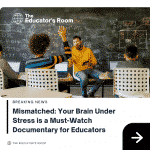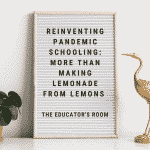We have all heard the guidelines around how to properly use an oxygen mask in case of emergency while flying. Whether you have flown Spirit, Delta, American, Frontier, United, Southwest, or Allegiant you have heard “…and remember to always put your own mask on first before helping others” (American Airlines Safety Video). But, why don’t teachers put their oxygen mask on before helping others?
[bctt tweet=”But, why don’t teachers put their oxygen mask on before helping others?” username=””]
Let’s first examine why self-care is especially important for teachers. Since the inception of the global pandemic, COVID-19, the job description of teachers everywhere changed without forewarning, and that in and of itself is stressful. Imagine the typical school experience–kids wearing backpacks, walking the halls, eating in the cafeteria, talking to and hugging their peers and teachers, and then BAM, ‘normal’ school as we knew it was shut down. First, it was three weeks, then three months, then almost a year before most states were able to transition into a type of hybrid learning plan where some students came in-person masked up, six feet apart in their own bubble, and others stayed home for remote instruction. Teachers project themselves on Zoom managing the students they have in their physical classroom space, while also ensuring to keep a distance if a behavior arises. Simultaneously, they are expected to manage the students at home in the virtual Zoom classroom, too. This is just one example of why teacher burnout is real.
The batteries of educators are drained by the halfway point of the academic day. Each day, an educator is going beyond their job description, making thousands of critical decisions, extending the “parameters of normal work hours because of an internal need to care for others even at our own physical, emotional, and financial expense. We are so busy caring for others that we have nothing left for ourselves at the end of the day…and we can’t do that forever. Self-care allows us to recharge so that we can keep going” (Erica Cooper-Peyton, first-grade teacher).
I empathize with all educators as this past year has been so trying. We all have pandemic trauma, so, with that being said, let’s look at how the self-care routine of educators has changed. When asking one teacher how her routine has changed since the pandemic she told me, “I (unfortunately) eat 100% more chocolate and carbohydrates than I did pre-covid. It’s a temporary fix and certainly isn’t healthy long-term but sometimes you just need a quick treat to pick you up!” (Erica Cooper-Peyton, first-grade teacher).
There is no judgment in this whatsoever. We know the best things to fuel our body are the good ole fruits and veggies but you can’t stash these in your desk drawers unless you are doing an experiment to show students how quickly things can mold or how quickly insects can be attracted to rotting food. Just saying. This hard-working first-grade teacher even acknowledged it isn’t healthy long term, but I guarantee in those stressful moments when she needs a pick-me-up, chocolate, and carb heavy treats are right there, conveniently within reach.
A veteran teacher, with thirty years of experience, told me she cries a lot more now and that feels good for her; she also eats more and says that doesn’t feel so good. “I am supposed to exercise more and stare at the sneakers by the door. I am supposed to talk to friends more but find I have little to say. I’ve read more books than I thought humanly possible” (Tracey Maxey, third-grade teacher). She hit the nail on the head. We know we should exercise as that combats stress and releases good endorphins, but at the end of the day teachers are so drained there is no energy remaining to put on the sneakers.
Barriers, barriers, barriers. We can acknowledge why self-care is important and how it’s changed over the course of the pandemic while we can simultaneously acknowledge there are barriers, right? So what are they?
Age is a barrier. “Being pushed into this situation [e-learning] at my age is uncomfortable and confidence shattering. I have had to rely on other professionals for help in ways that I had never imagined. Learning new skills and technologies from my colleagues that are less than half of my age has been a humbling experience. However, this has also led me to the realization that while my age might be a barrier to self-care, it is also an opportunity for personal growth and revitalization” (Tracey Maxey, third-grade teacher).
Not wanting to say no is a barrier. “…my personality plays a huge part because I am always analyzing and sometimes over-analyzing things to ensure I always give the best of myself to my students and their families and my colleagues. However, noticing the impact on my mental, emotional, and physical state of being, I am changing things now” (teacher requested to be anonymous because who wants to broadcast they want to say no but feel they literally cannot?)
Parenting is a barrier. “When you are a parent and your child is having a crisis…the mask doesn’t matter. The adrenaline kicks in and you run on autopilot until it is safe to pause and care for yourself. It has definitely gotten worse since the pandemic because while crisis situations happened occasionally in pre-covid times, they are now occurring regularly and with very little time for recovery” (Erica Cooper-Peyton, first-grade teacher).
The truth is we can come up with all the reasons not to take care of ourselves. It is a challenge for those in a selfless profession to become less selfless to the point their oxygen mask is put on first. We have to remember self-care isn’t selfish and we REALLY need to stop glorifying burnout. I challenge you to say no to extra responsibilities, ask for help, take care of your needs, leave work at work and see the change it will make after five school days. If I’m wrong, I will sub for you.






